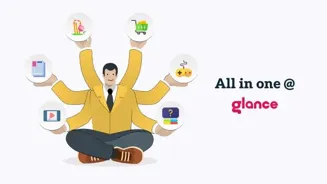Unleash productivity with 10 habits of top professionals. Dive into strategies for success in today's demanding world
In today’s fast-paced world, where deadlines are tighter than your favorite auntie’s
hug and expectations are higher than the Himalayas, being productive isn't just a good thing – it's absolutely essential for career success.
But let’s be real, staying on top of your game can feel like trying to balance a plate of samosas on your head during a wedding procession. It’s tricky! That’s where cultivating the right habits comes in.
These aren't just any old habits; these are tried-and-true tactics used by highly effective professionals to not only get things done but to excel while doing them.
So, grab your chai, settle in, and let’s explore the 10 habits that can transform you from a busy bee into a super-efficient powerhouse. We're diving into the strategies that separate the achievers from those who are simply overwhelmed.
This guide isn't about working harder; it's about working smarter.
Prioritize important tasks for maximum productivity
First things first: prioritize like a pro. Imagine your day as a plate overflowing with delicious but also some, well, not-so-delicious treats. You wouldn’t start by eating the bitter karela, would you? No! You’d go for the gulab jamun first, right?
Similarly, highly effective professionals tackle their most important tasks first. They identify what truly matters and focus their energy there. This might involve using methods such as the Eisenhower Matrix (urgent/important) or simply making a daily "to-do" list and ranking items by impact.
It’s all about making sure you are spending your precious time and energy on things that will actually move the needle. Before starting the day, take a few minutes to identify the top three priorities.
When you successfully complete these tasks, you will see your productivity increase significantly. Saying ‘no’ is a superpower; learn to wield it effectively, especially during the initial phase of developing into an effective professional.
Effective professionals master time management through scheduling, techniques like Pomodoro, timeboxing, and delegation
Here, we will see that effective professionals are masters of time management. They don’t just let the day happen to them; they design it. This means scheduling everything from meetings and focused work sessions to breaks and yes, even chai breaks!
Techniques like the Pomodoro method (25 minutes of focused work followed by a 5-minute break) can work wonders in maintaining concentration and preventing burnout. Timeboxing, where you allot specific blocks of time for specific tasks, ensures that everything gets its fair share of attention.
Furthermore, effective professionals are brilliant at delegation. They know when to ask for help and recognize that it's more efficient to share the load than to try and do everything themselves, especially, if someone else is better suited for the job.
Remember, you are not alone; leverage the strengths of your team. Time management, in the end, is not just about managing time but also about managing energy.
Cultivate a growth mindset for success in a changing world
Also, it is essential to cultivate a growth mindset. This means believing that your abilities and intelligence can be developed through dedication and hard work. It's the opposite of a fixed mindset, which assumes that your talents are static.
People with a growth mindset embrace challenges, see mistakes as learning opportunities, and persist in the face of setbacks. They are constantly seeking ways to improve and learn new skills. They read books, attend workshops, listen to podcasts, and network with other professionals.
The point is simple: those with a growth mindset are open to feedback and view criticism as a means of learning. This continuous improvement mindset is crucial for staying ahead in today's rapidly changing world. A professional should learn to adapt and grow.
Effective communication is key to success in any profession
Moving on, Communication is more than just talking; it's about understanding each other. Highly effective professionals are excellent communicators. They know how to articulate their ideas clearly, listen actively, and provide constructive feedback.
They are also adept at tailoring their communication style to different audiences, whether it's explaining a complex concept to a client or giving instructions to a junior colleague. Effective communication also involves being proactive.
This means anticipating potential problems and addressing them head-on. It also means keeping your team informed about your progress and being transparent about any challenges you are facing. This fosters trust and ensures that everyone is on the same page.
Good communication is the oil that keeps the engine of productivity running smoothly.
Balance is key for effective professionals; prioritize self-care
Furthermore, balance is crucial, you see. You can be the most efficient machine, crunching numbers and meeting deadlines faster than a Chapati being flipped at a roadside stall, but if you don't take care of yourself, you'll burn out faster than a Diwali rocket.

Highly effective professionals understand the importance of work-life balance. They prioritize their physical and mental well-being by getting enough sleep, eating healthy meals and exercising regularly. They also make time for hobbies, spending time with loved ones, and simply relaxing.
Taking breaks, going for a walk, listening to music or practicing mindfulness can significantly increase your energy levels and improve your focus. Remember, you are not a robot; you are a human being with needs. Neglecting those needs will eventually lead to decreased productivity.
So, take care of yourself.
Regular reflection is key to growth for professionals
Now, let's see why the habit of reflecting regularly is a game changer! It's easy to get caught up in the whirlwind of daily tasks, but taking time to reflect on your performance is essential for growth.
Highly effective professionals set aside time each week or month to review their goals, assess their progress, and identify areas for improvement. This might involve asking yourself questions like: What went well this week? What could I have done differently? What did I learn?
The insights gained from reflection can help you make better decisions, adjust your strategies, and ultimately become more effective. Think of it as hitting the reset button and recalibrating your compass. So, pause, reflect, and chart your course forward.
Remember, success is not a destination; it's a journey of continuous learning and refinement.
AI Generated Content. Glance/InMobi shall have no liability for the content












